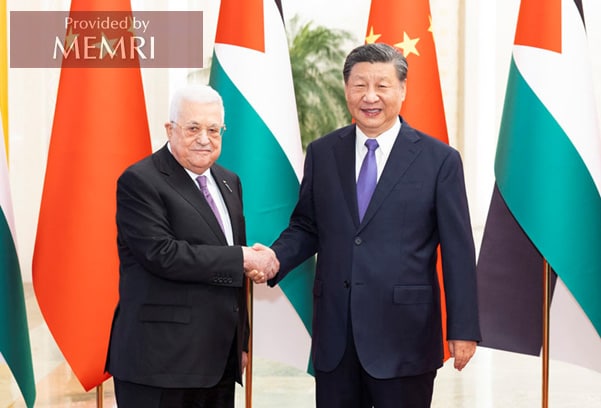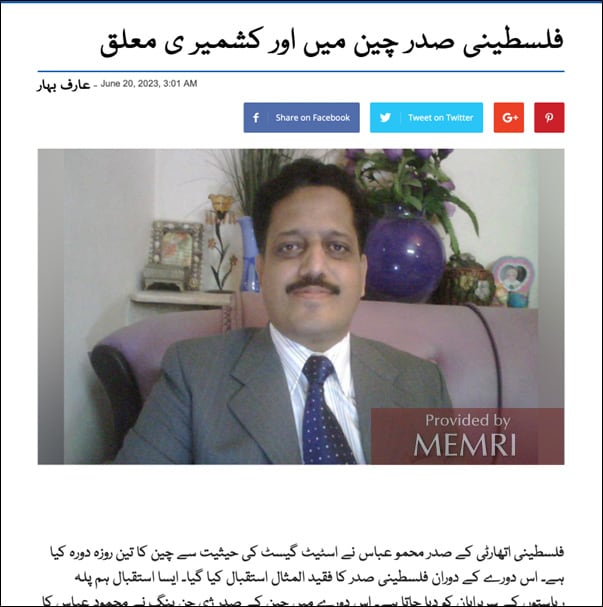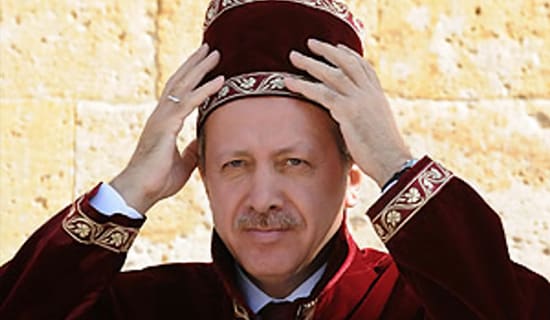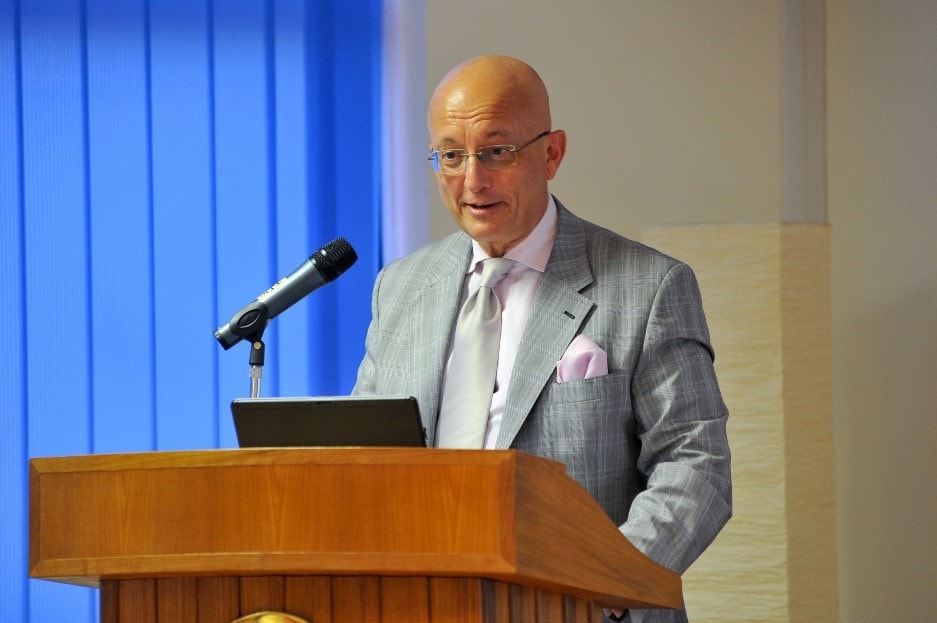Palestinian Authority President Mahmoud Abbas paid a four-day state visit to China starting June 13, 2023, and was honored with a 21-gun salute in Beijing at the controversial Tiananmen Square. This was his fifth official visit to China, the world's second-largest economy, and is being seen as helping shift the balance of power in the Middle East in favor of China.
Following his visit, the Pakistani Urdu daily Roznama Jasarat published an article exploring the possibility that Beijing could play a similar role in the Kashmir issue. Roznama Jasarat is the pro-Islamist newspaper of Jamaat-e-Islami Pakistan. The article, "The Palestinian President In China And Kashmiris In Suspension," by Arif Bahar, describes how China wanted to assist Kashmiris in guerrilla warfare against India in the wake of the 1962 Sino-Indian war but that American influence in Pakistan thwarted China in this effort.
The article adds that there was a secret meeting in 1965 in Algiers between Chinese leader Zhou Enlai and Sheikh Muhammad Abdullah, leader of Kashmiris in India. It adds that Mehbooba Mufti, former chief minister of India-controlled Jammu & Kashmir, has now mentioned that Kashmir wants to benefit from China-Pakistan Economic Corridor (CPEC), arguing in favor of effectively breaking the regional borders.

June 2023: Mahmoud Abbas with Chinese President Xi Jinping
Following are excerpts from the Roznama Jasarat article:[1]
"President Mahmoud Abbas Expressed Determination To Strengthen Cooperation And Relations With China In The Future, While The Chinese President Categorically Declared His Support For The Palestinian People In Their Struggle For Rights"
"Palestinian Authority President Mahmoud Abbas has paid a three-day [sic] visit to China as a guest of the state. During this visit, the Palestinian President was welcomed exceptionally. Such a welcome is given to the heads of equal states. During this visit, Chinese President Xi Jinping welcomed Mahmoud Abbas and he was presented with a guard of honor. Mahmoud Abbas inspected the guard of honor with President Xi. Meetings and talks were also held between the Chinese Foreign Minister [Qin Gang] and the Palestinian Foreign Minister [Riyad Al-Maliki] in which both sides agreed to walk with each other.
"President Mahmoud Abbas expressed determination to strengthen cooperation and relations with China in the future, while the Chinese president categorically declared his support for the Palestinian people in their struggle for rights. Mahmoud Abbas and Xi Jinping also addressed a joint event. Meanwhile, President Xi expressed his strong support for the Palestinian issue and reiterated the offer of mediation.
"President Xi also presented a three-point formula. The first [point] is the establishment of an independent state of Palestine with its borders extending to the [borders of the] period of 1967 with the capital of this state being East Jerusalem. Secondly, the international community should be allowed to move forward for the construction and development of Palestine so that the international community can help on humanitarian grounds...
"Thirdly, the Palestine-Israel peace talks should be steered in the right direction. The historical status of the holy sites in Jerusalem should be respected, and provocative statements and actions that could threaten the peace process should be avoided. It should be ensured that Palestine and Israel live according to the principle of coexistence, and China can play its role in this regard.
"Through these three points, China has put its weight behind the Palestinian public in the long-standing conflict in the Middle East, and Mahmoud Abbas has also announced a strategic partnership with China regardless of the regional situation. Palestine is not a recognized country, but the Authority headed by Mahmoud Abbas is born out of a mutual agreement with Israel, which the world remembers as the Oslo Accords."
"In The Name Of The Balance Of Power In The Middle East, The U.S. Put All Its Weight In Favor Of Israel Against The Palestinians – As A Result Of Which Palestine Was Turned Into A Dot From A Circle, And Israel Was Transformed Into A Circle From A Dot"
"Nevertheless, China gave the Palestinian president the protocol of a recognized head of state, showing a slim picture of its Middle East and Palestine policy in the coming days. At this point of time, China is marching on the path of becoming a rival power in the world and is closer to transforming itself into an international economic giant. This face of China is troubling the U.S..
"China has entered the in the tent of the Middle East. Saudi Arabia, which was a close ally of America, is now getting closer to China. The seemingly never-ending conflict between Saudi Arabia and Iran is ending with the mediation of China. China is now moving forward in this direction and wants to emerge as a mediator in the Palestinian conflict. The Palestinian people have also decided to stand with China.
"The problem of Palestine was created by the British government, and it was inherited by the U.S.. And in the past 75 years, the U.S. has maintained its central role in this problem. In the name of the balance of power in the Middle East, the U.S. put all its weight in favor of Israel against the Palestinians – as a result of which Palestine was turned into a dot from a circle, and Israel was transformed into a circle from a dot.
"In fact, the U.S. gave the last stab in the back of this movement when it moved its embassy from Tel Aviv to Jerusalem; because of this, all the possibilities of the emergence of the state of Palestine have disappeared. Now, the Palestinians have started looking to China as they emerge on the world stage to break the 75-year-old U.S.-established status quo."
"In The Case Of The 1962 Sino-India War… China Offered Pakistan To Advance [Militarily] In Kashmir And China Would Help Pakistan On This Front While Fighting Against India"
"Like the Palestine problem, the Kashmir issue in South Asia was also created by Britain and inherited by the U.S., and it was handled by the U.S. as a problem in the style of Palestine in such a way that it would benefit India. Whenever Pakistan or Kashmiris tried to break this status quo, America came running and thwarted this attempt.
"One of its [America's] attempts was in the case of the 1962 Sino-Indian War, when China offered Pakistan to advance [militarily] in Kashmir and China would help Pakistan on this front while fighting against India. When the U.S. smelled this offer, it pressured [Pakistani military ruler] Ayub Khan and promised that the U.S. would try to resolve the Kashmir issue as soon as the Sino-Indian war was over.
"Pakistan missed this train, and missed the opportunity for Kashmir's freedom or Pakistan's major breakthrough [on the Kashmir issue]. Whether America had resolved the problem of Kashmir or not, the missing of this opportunity [by Pakistan] made the Kashmiris' sorrowful journey long.
"In 1964, Chinese Foreign Minister Liu Shaoqi visited Pakistan, and the Chinese leadership was influenced by bitter memories of the war with India. On this occasion, the Chinese foreign minister expressed his desire to meet with the Kashmiri leadership. A delegation of Kashmiris was organized for this meeting, in which [Pakistan-controlled] Azad Kashmir was represented by Sardar Abdul Qayyum Khan and [Indian-]Occupied Kashmir was represented by Pir Maqbool Gilani.
"With this delegation, the Chinese foreign minister offered all kinds of support to the Kashmiri leadership, and a joint military plan was even discussed. The Chinese foreign minister said that the Kashmiri leadership should provide them[ the Chinese]with young people who could be trained in guerilla warfare.

"In response to this proposal, the Kashmiri leadership said that this proposal should be given to the government of Pakistan, because the Kashmiri leadership was not authorized to make a decision on this matter. The Chinese foreign minister responded to this mockingly, saying that the Kashmiris' movement is for freedom and that it was strange that Pakistan has to decide. Thus, this opportunity to break the U.S.-backed status quo in the region was lost.
"The [1965 secret] Algiers meeting between Chinese President [i.e. Premier] Zhou Enlai and Sheikh Muhammad Abdullah [Kashmiri leader from India] also reflected the desire for direct connection between China and Kashmir. Recently, this meaningful statement by the former Chief Minister of [Indian-controlled Jammu and] Kashmir, Mehbooba Mufti, came out: that Kashmir wants to enjoy the benefits of CPEC [China-Pakistan Economic Corridor]."
"Now, Recently, The Politicians Of [Pakistan-Controlled] Azad Kashmir... [Are] Demanding That The Government Of Pakistan Recognize The Azad Kashmir Government As A Revolutionary Government"
"Now, recently, the politicians of [Pakistan-controlled] Azad Kashmir issued a declaration, following a seminar organized by the Pakistan Arts Council, demanding that the government of Pakistan recognize the Azad Kashmir government as a revolutionary government. This is the same demand that came up in the 1960s, and the government of Pakistan had started seriously considering this demand.
"Khurshid Hasan Khurshid's government [in Pakistan-controlled Azad Kashmir, 1959-1964] had also written to Karachi-based diplomats to support this campaign [for a revolutionary government]. At that time, Pakistani foreign minister Manzoor Qadir visited Azad Kashmir and received the protocol of a foreign guest. This campaign once again raised the fear of breaking the status quo, and this campaign was wrapped up.
"Now, if Pakistan continues to be tied to the pegs of America, then it is impossible for there to be anything new regarding Kashmir in the near future – rather, Pakistan will continue to lose its old position. If Pakistan breaks the 75-year-old status and allows Kashmiris to fly in new skies like Mahmoud Abbas, then there can be hope for a resolution of the Kashmir problem. Disinterested Pakistan seems to be maintaining the status quo for the next 75 years – which in itself is no less than a tragedy."
[1] Roznama Jasarat (Pakistan), June 21, 2023.





